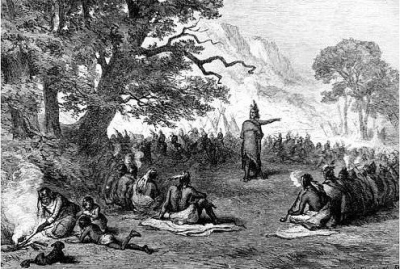Pontiac or Obwaandi'eyaag (c. 1714/20 April 20, 1769) was an Odawa war chief known for his role in the war named for him, from 1763 to 1766 leading Native Americans in an armed struggle against the British in the Great Lakes region due to, among other reasons, dissatisfaction with British policies. It followed the British victory in the French and Indian War, the American front of the Seven Years' War. Pontiac's importance in the war that bears his name has been debated. Nineteenth-century accounts portrayed him as the mastermind and leader of the revolt, but some subsequent scholars argued that his role had been exaggerated. Historians today generally view him as an important local leader who influenced a wider movement that he did not command.
The war began in May 1763 when Pontiac and 300 followers attempted to take Fort Detroit by surprise. His plan foiled, Pontiac laid siege to the fort, where he was eventually joined by more than 900 warriors from a half-dozen tribes. Meanwhile, messengers spread the word of Pontiac's actions, and the war expanded far beyond Detroit. In July 1763, Pontiac defeated a British detachment at the Battle of Bloody Run, but he was unable to capture the fort. In October, he lifted the siege and withdrew to the Illinois Country. Pontiac's actions contributed to the British Crown's issuance of the Proclamation of 1763, which prohibited any settlers west of the Appalachian Mountains to preserve an area for Native Americans.
Pontiac's influence declined around Detroit because of the siege but he gained stature as he continued to encourage the various tribal leaders to fight against the British. Seeking to end the war, British officials made him the focus of their diplomatic efforts. In July 1766, he made peace with British Superintendent of Indian Affairs Sir William Johnson. The British attention to Pontiac aroused resentment among other tribal leaders, as the war effort was decentralized. Pontiac claimed greater authority than he possessed. He was increasingly ostracized and in 1769 he was assassinated by a Peoria warrior.
Pontiac's War (also known as Pontiac's Conspiracy or Pontiac's Rebellion) was launched in 1763 by a loose confederation of Native Americans dissatisfied with British rule in the Great Lakes region following the French and Indian War (1754–1763). Warriors from numerous nations joined in an effort to drive British soldiers and settlers out of the region. The war is named after Odawa leader Pontiac, the most prominent of many Indigenous leaders in the conflict.
The war began in May 1763 when Native Americans, alarmed by policies imposed by British General Jeffrey Amherst, attacked a number of British forts and settlements. Eight forts were destroyed, and hundreds of colonists were killed or captured, with many more fleeing the region. Hostilities came to an end after British Army expeditions in 1764 led to peace negotiations over the next two years. The Natives were unable to drive away the British, but the uprising prompted the British government to modify the policies that had provoked the conflict.
Warfare on the North American frontier was brutal, and the killing of prisoners, the targeting of civilians, and other atrocities were widespread. In an incident that became well-known and frequently debated, British officers at Fort Pitt attempted to infect besieging Indians with blankets that had been exposed to smallpox. The ruthlessness of the conflict was a reflection of a growing racial divide between Indigenous peoples and British colonists. The British government sought to prevent further racial violence by issuing the Royal Proclamation of 1763, which created a boundary between colonists and Natives.

1763May, 7
Pontiac's War begins with Pontiac's attempt to seize Fort Detroit from the British.
Choose Another Date
Events on 1763
- 10Feb
Treaty of Paris (1763)
French and Indian War: The Treaty of Paris ends the war and France cedes Quebec to Great Britain. - 7May
Pontiac (Ottawa leader)
Pontiac's War begins with Pontiac's attempt to seize Fort Detroit from the British. - 2Jun
Fort Michilimackinac
Pontiac's Rebellion: At what is now Mackinaw City, Michigan, Chippewas capture Fort Michilimackinac by diverting the garrison's attention with a game of lacrosse, then chasing a ball into the fort. - 1Sep
Foundling Home in Moscow
Catherine II of Russia endorses Ivan Betskoy's plans for a Foundling Home in Moscow - 7Oct
Royal Proclamation of 1763
King George III of the United Kingdom issues the Royal Proclamation of 1763, closing aboriginal lands in North America north and west of the Alleghenies to white settlements.

 English
English  español
español  français
français  português
português  русский
русский  العربية
العربية  简体中文
简体中文 